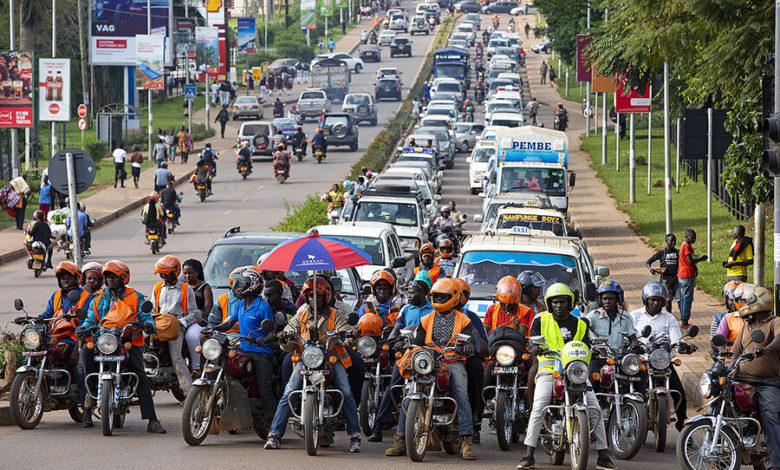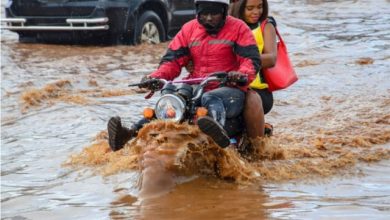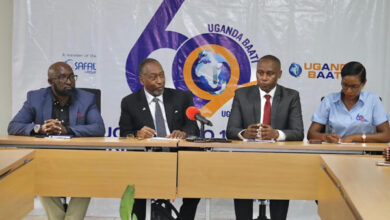The boda boda industry as an engine for economic growth
Eighty percent (80%) of the Boda Boda riders are youth within the age of 18-35 years. Again Eighty percent (80%) of the Boda Boda riders have families of an average of 6 persons. On average a boda boda rider rides about 100km a day using about 3 litres of fuel. They ride 25-30 persons a day.

Boda Boda was born as a result of an inefficient means of transport across the border. It was also associated with carriers smuggling operations across the Uganda Kenya border in the 1980s and early 1990s.
The carriers either walked, used bicycles or motorcycles across the border. The need became so big especially with the increase in cross border trade and pioneer business personalities like BMK has to seize the opportunity to import Motorcycles to serve this need.
Then it started spreading to different towns to ease the carrying of luggage and persons from place to place. Boda Boda became very handy in camps of internally displaced persons as employment for the youth and also service to carry the sick and the dead. Today Boda Boda may be the person who rides or the motorcycles itself based on the context. They are several companies now importing different types of motorcycles.
Given that the business has low entry barriers and gives daily income, it has become a substantial source of income for many youths, providing livelihood to thousands of families in the country. Today the industry has also attracted graduates, tour and travel investors like Uganda Adventure Safaris and Boda Boda Tours’, safeboda, bolt uber providing personalized affordable transport services.
SafeBoda started in 2014 provides safe and efficient boda boda rides for those in need of quick travel across several cities in Africa. In Nairobi, Kenya in 2017 and in 2019 they forayed into Nigeria’s Ibadan. SafeMotos was launched in Kigali, Rwanda and has expanded to the Democratic Republic of the Congo. Bolt launched boda boda ridesharing services in Uganda to complement its e-taxi services. Uber also added their e-boda services in Uganda in March 2018 and operates in Kampala.
General Statistics
The available information indicates a range of 1,500,000 boda bodas in Uganda. Of these 1,000,000 are registered and operate within the Boda Boda organizational structure. Seven hundred and fifty thousand (750,000) are operating within Kampala, Mukono and Wakiso District.
Eighty percent (80%) of the Boda Boda riders are youth within the age of 18-35 years. Again Eighty percent (80%) of the Boda Boda riders have families of an average of 6 persons. On average a boda boda rider rides about 100km a day using about 3 litres of fuel. They ride 25-30 persons a day.
The riders may repair their motorcycles at least once a month and they clean it at least twice a week. On average 6/10 riders do not own the motorcycles. These remit at least 50,000 to 100,000 to the owner of the motorcycles or the bank a week. They make a gross profit in the range of 20,000-30,000 per day based on where they are located.
Organizational structure
The Boda Boda industry is organized from the village stage up to the District level. At village level, there is a stage. A village stage ideally should have a maximum number of 30 Boda Boda riders. These are registered by the stage Chairperson. These aggregate at parish or division or municipal level and they have a leadership structure. There is an elected committee led by the District Chairperson.
The registered riders pay a membership and subscription that supports administration of the industry. The leaders offer protection to the community. In case of loss of luggage once the passenger reports to the stage, it is handled to the point of recovery. There are bylaws that govern each stage.
They also offer social support to the riders this includes having a saving group where they can borrow from to grow their side business, social fund in times of injury, death or social events. About 30% of the riders are not registered in the official organizational structure and they have no specific stage. They are called Lubyanza. These pick passengers from anywhere and may never be traced incase of any incidence of theft. It is also said that these may not necessary be trained in riding. There are also private registered riders in companies like Safe Boda, Bolt and Uber that can be accessed online.
Challenges
Due to the urge to seize a moment to get as many customers as possible, the riders are prone to many accidents. In 2022, boda bodas were involved in 43% of all road accidents in Uganda, resulting in 1,422 deaths and 401 injuries. The statistics further show Uganda lost 650 children below the age 18 in road crashes in 2022 while those who died between the ages of 18 to 24 were 703. When they die in accidents their families suffer most considering that they are the main bread winners. These accidents are caused by poor vision, poor condition of the motorcycles, learners, over speeding, poor judgment, failure to obey traffic rules, being tired, potholes and driving under the influence of alcohol.
The riders are prone to health hazard among others for failing to protect them. Some carry helmets which they never put on. This has had an effect on their eyes by allowing dust to enter. They expose themselves to wind over a long time which more often than not affects their chest. In managing time and budget they also feed poorly and a good number of them have ulcers. They take snacks a lot and hardly any fruit. A number of riders start their day at 4am and close at 12am. This gives them very limited time for sleeping to rejuvenate their bodies. Sometimes they are found sleeping on the stage to compensate for the lost sleep.
The riders have all sorts of names and accusations. Some see them as thieves, defilers, aids to murders and some high profile persons have referred to them as mad. This lowers their esteem despite the service of increased efficiency and solving the lack of an efficient public transport all the time in all places.
They earn daily and at times saving becomes challenge where they many dependants. This makes it hard for them to retire. Besides they do not subscribe to a social fund like NSSF and therefore they are highly exposed in old age.
They are prone to thieves given that they are hired to go to lonely places that are poorly lit, they move alone very early morning or late at night and at times they are hired by robbers and armed criminals. Their boda boda is also a target for thieves.
More often than not they have no permits and they are always a big catch for the traffic place. Many motocycles are always seen packed at police stations and that means that they miss their daily income and in most cases their dependants suffer as well.
They have a secret brotherhood code that protects their own even when they are in wrong. This more often that not results in mob justice especially if their own has been knocked and at times they suffer the repercussions of the same.
Boda Boda industry Opportunities to impact the economy
Boda Boda is the second largest employer of youth in Uganda after agriculture. Over one million five hundred thousand motorcycles are on the roads in Uganda. They support the livelihood of at least 6 million Ugandans who depend on the riders. It became an industry that serves many actors among others: importers, business owners, repair shops, protective wear manufactures (rider suits, goggles, helmets) fuel business, washing bay, food vendors and land lords of stages.
They contribute towards taxes from the exercise duty on fuel. With a tax of UGX 1,450 per and each rider on average consuming three liters a day and individual rider contributes over 1,5 a year in taxes and as a group of 1.5m riders they contribute over 6 billion in taxes per day.
With companies like SafeBoda that remit PAYE they make a contribution of an average of UGX 1.1 billion per annum. Compliant riders like those of safeboda who are compelled to pay third-party motor insurance and Public Service Vehicle (PSV) licenses contribute approximately Ug Shs 3bn per annum.
Boda Bodas play multiple roles that free workers elsewhere to concentrate on their work. They serve as school shuttles, ambulance, shopping, Mobile shops, live campus, help in irrigation, planting, tilling. They saved a life of the Minister of Works and Transport.
Given their strategic location on the roadside they are vital in gathering first hand information which is useful during investigations of incidences. More than 75% of the riders own a smart phone. They also can be handy in tracing thieves.
Recommendations for a more impactful Boda Boda industry:
Strengthening the organizational structures of Boda Boda riders to serve as avenues for training, business skills development, maintaining law and order and ensuring good code of practice. Allowing for sharing of good practice from models that delivering impact like safe boda.
Establish Industry Standards: PSFU recommended the establishment of comprehensive industry standards, encompassing standardized registration and operating procedures for all Boda Boda riders. This has to be done by passing the Traffic and Road Safety (Motorcycles and Motorised Tricycles) (Amendment) Regulations, 2022. (Under section 178 of the Traffic and Road Safety Act, 1998, Cap 361).
Registration and digitization of the boda boda riders to ease their management. Making use of the Boda Boda riders to relay important transformational messages especially to the many passengers they meet daily.
The writer is Gudula Naiga Basaza, Managing Director Gudie Leisure Farm






